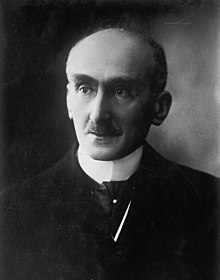
Back Henri Bergson Afrikaans Henri Bergson AN هنري برجسون Arabic هنرى برجسون ARZ Henri Bergson AST Henri Bergson AVK आन्रि बर्गसां AWA Anri Berqson Azerbaijani Анры Бергсон Byelorussian Анры Бэргсон BE-X-OLD
Henri Bergson | |
|---|---|
 Bergson pada 1927 | |
| Kelahiran | Henri-Louis Bergson 18 Oktober 1859 Paris, Perancis |
| Meninggal dunia | 4 Januari 1941 (umur 81) Paris, Perancis |
| Pusat pendidikan | |
Karya terkenal |
|
| Pasangan | Louise Neuberger (k. 1891) |
| Anugerah | Hadiah Nobel dalam Kesusasteraan (1927) |
| Era | Falsafah abad ke-20 |
| Falsafah | Falsafah Barat |
| Sekolah | |
| Institusi | Collège de France |
Kepentingan utama | |
Idea cemerlang |
|
Mempengaruhi
| |
Henri-Louis Bergson (Perancis: [bɛʁksɔn]; 18 Oktober 1859 – 4 Januari 1941) ialah seorang ahli falsafah Perancis-Yahudi yang berpengaruh dalam tradisi falsafah benua, terutamanya pada separuh pertama abad ke-20 hingga Perang Dunia Kedua.[6] Bergson terkenal dengan hujah yang menumpu kepada kepeintingan proses pengalaman dan intuisi serta-merta jauh melebihi rasionalisme abstrak dan sains untuk memahami perkara yang hakiki dalam hidup.
Beliau ialah penerima Hadiah Nobel dalam Kesusasteraan tahun 1927.
- ^ John Ó Maoilearca, Beth Lord (eds.), The Continuum Companion to Continental Philosophy, Bloomsbury Academic, 2009, p. 204.
- ^ Ford, Russell (2004), 'Immanence and Method: Bergson's Early Reading of Spinoza,'. The Southern Journal of Philosophy 42(2): 171–92. doi:10.1111/j.2041-6962.2004.tb00995.x
- ^ Astesiano, Lionel: Joie et liberté chez Bergson et Spinoza. (Paris: CNRS Éditions, 2016)
- ^ Hancock, Curtis L. (May 1995). "The Influence of Plotinus on Berson's Critique of Empirical Science". In R. Baine Harris. Congress of the International Society for Neoplatonic Studies held in May 1995 at Vanderbilt University. Neoplatonism and Contemporary Thought. 10. International Society for Neoplatonic Studies. Albany: State University of New York Press. m/s. 139ff. ISBN 978-0-7914-5275-2. https://books.google.com/books?id=1PwTZPW1ohQC&printsec=frontcover. Diperolehi 10 May 2010. "That the philosophy of Henri Bergson is significantly influenced by the doctrines of Plotinus is indicated by the many years Bergson devoted to teaching Plotinus and the many parallels in their respective philosophies. This influence has been discussed at some length by Bergson's contemporaries, such as Emile Bréhier and Rose-Marie Rossé-Bastide. ..."
- ^ R. William Rauch, Politics and Belief in Contemporary France: Emmanuel Mounier and Christian Democracy, 1932–1950, Springer, 2012, p. 67.
- ^ Merquior, J. G. (1987). Foucault (Fontana Modern Masters series), University of California Press, ISBN 0-520-06062-8.